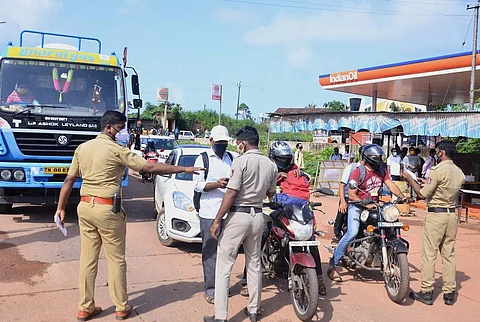

From Thursday, August 5, any person in Kerala will need one of the three documents to enter shops, markets, banks, public and private offices, financial institutions, factories, industrial establishments, and open tourist spaces — a certificate of at least one dose of COVID-19 vaccine (two weeks prior); an RT-PCR negative certificate (72 hours prior); or results of showing recovery from COVID-19 one month ago. Kerala government’s latest order would essentially mean that even to visit a store to buy essential items and groceries, a common man would need one of the three documents. These rules, however, are exempted for those going to vaccine centres, labs to get COVID-19 tests, to buy medicines, attend a relative’s funeral or weddings, to write examinations, or to board trains, flights, a ship or buses.
While these may be measures to contain the spread of COVID-19 amid a high number of cases in the state, the order does not supplement the ground reality and is impractical for a common man. The order, which drawn flak from many residents, comes amid the vaccine shortage as said by the Kerala Health Minister and when the state has been doing more antigen tests than RT-PCR tests.
Father Jijo Kurien, a Franciscan priest from Idukki and a social activist, fears he won’t be able to go to shops due to obstacles in getting the COVID-19 vaccine shot. “In July, I went to a vaccination centre, took a token, and waited in a long queue. Finally, when my turn came, the officers there said only those who above 45 years will be given vaccination,” he said in a Facebook post. This is despite the fact that Kerala, like other states in India, has opened the vaccination programme to all individuals above 18 years old.
“Nevertheless, when I tried to get the vaccine for the senior citizen who was with me, they could not vaccinate her because she had some allergies,” he said. Fr Jijo finally managed to get vaccinated from a private hospital, but, he said, his data has not been entered in the hospital system and so he has no certificate yet. He alleged the new regulations are “the result of rule by bureaucracy, who can't understand common man's problems.”
Joseph, a 22-year-old man from Kannur, lives with his grandparents. He has not received his vaccine shots since he has not been able to find a slot online, which is filled within seconds, he said. “My father lives in another district. If these regulations are implemented, I will not be able to buy essentials for our house. My grandparents also cannot go out as they are sick," he said.
In late July, Kerala Health Minister Veena George had said that the state had little or no vaccines in several districts. So far, 1.48 crore or 56% of the eligible population above 18 years in Kerala have received the vaccine, while 23% of them have been fully vaccinated, as of August 3.
RT-PCR tests are only available at private labs. Government institutions do RT-PCR tests only if the person is exhibiting symptoms. So, to get tested by the RT-PCR method each time, a non-vaccinated person should spend Rs 500. Another option is to get vaccinated from private hospitals, which charge Rs 780 per dose.
Karthyani, a domestic worker from Kasaragod, too, has been among many who have been waiting to get a slot for vaccination. “Vaccinations are now happening ward-wise. I will have to wait at least a month for the vaccination drive to begin in my ward or I will have to spend Rs 780 to get it from a private hospital," she said.
The new guidelines to ease the curbs imposed in Kerala were announced as part of allowing shops, markets, banks, offices, financial institutions, factories, industrial establishments, tourist spaces, and other establishments to function six days a week from Monday to Saturday. A section of traders has welcomed this move and is happy that they are allowed to open shops six days a week as per new regulations.
"The regulations are a bit stringent. However, considering the situation, we need to be more careful. We have no other option. Also, vaccination is happening in the state at a good speed, so we hope there will not be many issues in the revised rules," ES Biju, General Secretary of the merchants association, Vyapari Vyavasayi Ekopana Samithi told TNM.
Earlier, the state government had imposed restrictions based on Test Positivity Rate in Local Self Government Institutions. Now, the government has decided to impose special intensified stringent lockdown restrictions in the LSGIs with critical spread based on the Weekly Infection Population Ratio (WIPR), considering the increase in COVID-19 cases. WIPR is the total number of COVID-19 infections reported in the week multiplied by 1,000 divided by the total population of the panchayat or urban ward.